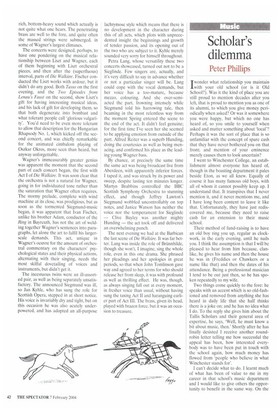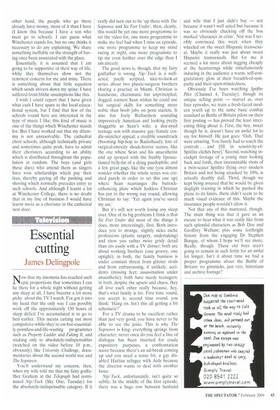Scholar's dilemma
Peter Phillips
Iwonder what relationship you maintain with your old school (or is it Old School?). Was it the kind of place you are still proud to mention decades after you left, that is proud to mention you as one of its alumni, to which you give money periodically when asked? Or was it somewhere you were happy, but which no one has heard of, so you smile to yourself when asked and mutter something about 'local'? Perhaps it was the sort of place that is so unfamiliar with the concept of spare cash that they have never bothered you on that front; and mention of your eminence merely causes them to look uncertain?
I went to Winchester College, an establishment almost everyone has heard of, though in the boasting department it pales beside Eton, as we all knew. Equally of course it has many famous old boys, with all of whom it cannot possibly keep up. I understand that. It transpires that I never mention it, and it never mentions me, and I have long been content to leave it like that. Unfortunately, they have just rediscovered me, because they need to raise cash for an extension to their music school.
Their method of fund-raising is to have an old boy ring you up, regular as clockwork, in the early evening, until he nails you. I think the assumption is that I will be pleased to hear from him because, clanlike, he gives his name and then the house he was in (Freddies or Chawkers or a name like that) and then the dates of his attendance. Being a professional musician I tend to be out just then, so he has spoken repeatedly to my wife.
Two things come quickly to the fore: he speaks with an accent which is so old-fashioned and removed from anything she has heard in daily life that she half thinks there is a joke on; and he has no idea what I do. To the reply she gives him about the Tanis Scholars and their general area of expertise, he says, 'Well, he must know a bit about music, then.' Shortly after he has finally desisted I receive another roundrobin letter telling me how successful the appeal has been, how interested everybody was to have been put in touch with the school again, how much money has flowed from 'people who believe in what Winchester stands for'.
I can't decide what to do. I learnt much of what has been of value to me in my career in that school's music department and I would like to give others the opportunity to benefit in the same way. On the
other hand, the people who go there already have money, more of it than I have (I know this because I have a son who must go to school). I can guess what Winchester stands for, but no one thinks it necessary to do any explaining. We share something ineffable on the strength of having once been associated with the place.
Essentially, it is assumed that I am going to be supportive of their way of life, while they themselves show not the remotest concern for me and mine. There is something about that little equation which sends shivers down my spine: I have suffered from blithe assumptions like this.
I wish I could report that I have given what cash I have spare to the local educational system, but I find that few of the schools round here are interested in the type of music I like; this kind of music is one of the things which Winchester stands for. But I have worked out that my dilemma is not unresolvable. The cathedral choir schools, although technically private and sometimes quite posh, have to admit their choristers according to an ability which is distributed throughout the population at random. The boys (and girls these days) who attend them as singers have won scholarships which pay their fees, thereby guying all the pushing and shoving which normally precedes entry to such schools. And although I learnt a lot at Winchester College, there is no doubt that in my line of business I would have learnt more as a chorister in the cathedral next door.



























































 Previous page
Previous page